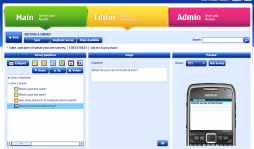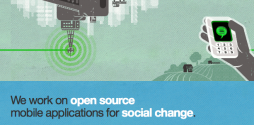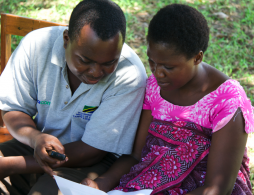open source
Posted by MarkWeingarten on Jan 13, 2011
Open Data Kit: Tools to Build Information Services for Developing Regions data sheet 1136 Views
Author:
Hartung, Carl, Yaw Anokwa, Waylon Brunette, Adam Lerer, Clint Tseng, and Gaetano Borriello
Abstract:
This paper presents Open Data Kit (ODK), an extensible, open-source suite of tools designed to build information services for developing regions. ODK currently provides four tools to this end: Collect, Aggregate, Voice, and Build. Collect is a mobile platform that renders application logic and supports the manipulation of data. Aggregate provides a “click-to-deploy” server that supports data storage and transfer in the “cloud” or on local servers. Voice renders application logic using phone prompts that users respond to with keypad presses. Finally, Build is a application designer that generates the logic used by the tools. Designed to be used together or independently, ODK core tools build on existing open standards and are supported by an open-source community that has contributed additional tools. We describe four deployments that demonstrate how the decisions made in the system architecture of ODK enable services that can both push and pull information in developing regions.
Posted by MarkWeingarten on Jan 12, 2011
Using Mobile Phones and Open Source Tools to Empower Social Workers in Tanzania data sheet 1459 Views
Author:
Dias, M. Beatrice, Daniel Nuffer, Anthony Velazquez, Ermine A. Teves, Hatem Alismail, Sarah Belousov, M. Freddie Dias, Rotimi Abimbola, Bradley Hall, and M. Bernardine Dias
Abstract:
Although para-social workers carry the primary responsibility in providing essential services to the growing population of orphans and vulnerable children in Tanzania, they are often not paid for this work. Moreover, these para-social workers are unable to access governmental resources due to the lack of an efficient means of reporting their needs to relevant government officials in a timely manner.
In this paper we describe a text message (SMS) based solution that harnesses the prevalence of mobile phones coupled with several Open Source tools to empower these para-social workers. Specifically, we build a more efficient mechanism for reporting summary data on orphans and vulnerable children to relevant government officials in a cost-effective and efficient manner. This paper reports on our needs assessment process, reviews the related work, describes the implementation and testing of our prototype solution, and concludes with a discussion of relevant future work.
Posted by PrabhasPokharel on Aug 10, 2010
Nokia Data Gathering, a Nokia-built software tool for mobile data collection, recently open-sourced its code. The software has two parts: a server-side tool that can be used to create forms and maintain a database, and a handset client for field workers to use for mobile, in-the-field data collection. Both pieces are licensed under the GPL version 2. The project site is available at Forum Nokia, and invites third-party patches.
Posted by MohiniBhavsar on Jul 02, 2010
Engineering Rural Development data sheet 2485 Views
Abstract:
Presented here is an overview of the operational needs of NGOs and CBOs and the role information systems can play to increase their accountability and efficiency. Information systems need to fit the diverse operational needs of NGOs and CBOs, which include coordinating activities, training and monitoring staff, documenting results, accounting, reporting, decision making and learning, acquiring external information and encouraging community participation.
Unfortunately, there are gaps in information systems that impede the ability of NGOs to embrace ICT. To name a few, the lack of open, accessible, cross-platform mobile development tools, limited opportunities and resources provided to local small software companies to engage with NGOs, and the lack of long distance networking technologies to reach remote locations.
Two examples of technologies that were applied successfully are shared: Self Help MIS, an application to monitor activities of small microfinance organizations and credit groups and DigitalICS, an application for data collection used by agricultural cooperatives. The author stresses that ICTs should be viewed as a tool to allow local change agents to be more effective and accountable and shows how computing is able to support local organizations by inspiring innovation, implementation and dissemination of projects, and measuring impact.
Posted by AnneryanHeatwole on Nov 18, 2009
Instead of cracking open a book, try sitting back with a short story on your phone. CellStories, which launched in September, offers a new short (1500-2500 words) story every weekday to readers on mobile phones. The website only shows its daily short stories to visitors coming to the site on mobile phones – those on a desktop see a welcome page and are encouraged to come back on a web-enabled mobile.
| MobileActive's Pick of the Week: CellStories - Short Stories on Your Mobile data sheet 4048 Views |
| Countries: |
United States
|
Posted by kmulloy on Oct 30, 2009
RapidSMS data sheet 5968 Views
Organization that developed the Tool:
Problem or Need:
Improved data collection and group coordination. Automatic analysis and response.
Brief Description:
Framework and libraries for building SMS services rapidly
Tool Category:
App resides and runs on a server
Is a web-based application/web service
Resides and runs on a computer with tethered modem or mobile phone
Key Features :
Modem drivers for GSM modems and handsets, message parsing libraries, event APIs, and web interface for displaying data, exporting data, and administering system.
Main Services:
Bulk SMS
Voting, Data Collection, Surveys, and Polling
Location-Specific Services and GIS
Mobile Social Network/Peer-to-peer
Platforms:
Linux/UNIX
Mac/Apple
Windows
All phones -- SMS
Organizations Using the Tool:
UNICEF, Millennium Villages, Dimagi, Tostan, Appfrica, Berkeley Air/ E+Carbon, University of Cape Town Spatial Data Management research team
Number of Current End Users:
Support Forums:
http://groups.google.com/group/rapidsms
irc://freenode.net #rapidsms
Languages supported:
English, French, Puular, Wolof, Joola
Reviews/Evaluations:
MobileActive reviews: http://bit.ly/byF7v http://bit.ly/2beJ90 http://bit.ly/gozE3
SIPA report on Malawi: http://mobileactive.org/evaluation-rapidsms-child-nutrition-surveillance-malawi
Is the Tool's Code Available?:
URL for license:
http://github.com/rapidsms/rapidsms/blob/master/LICENSE
Is an API available to interface with your tool?:
Posted by yanokwa on Oct 06, 2009
Open Data Kit (ODK) data sheet 11689 Views
Organization that developed the Tool:
Problem or Need:
Collecting data and delivering information developing regions is hard.
Brief Description:
Open Data Kit is a set of free tools used all over the world to make data collection and information delivery easier.
Tool Category:
App resides and runs on a mobile phone
App resides and runs on a server
Is a web-based application/web service
Key Features :
Open Data Kit primarily provides an out-of-the-box solution for users to:
- Build a data collection form or survey
- Collect the data on a mobile device and send it to a server
- Aggregate the collected data on a server and extract it in useful formats
See http://opendatakit.org/about/tools for a listing of all our tools.
Main Services:
Interactive Voice Response (IVR)
Multi-Media Messaging (MMS) or other Multi-Media
2D Barcodes
Voting, Data Collection, Surveys, and Polling
Location-Specific Services and GIS
Information Resources/Information Databases
Stand-alone Application
Platforms:
Android
Linux/UNIX
Mac/Apple/iPhone
Windows
Organizations Using the Tool:
Number of Current End Users:
Number of current beneficiaries:
Support Forums:
http://opendatakit.org/about/contact
Handsets/devices supported:
Primarily Android-based devices, but we do support other Java-based phones.
Reviews/Evaluations:
http://opendatakit.org/about/research
http://opendatakit.org/about/press
Is the Tool's Code Available?:
URL for license:
http://www.apache.org/licenses/LICENSE-2.0
Is an API available to interface with your tool?:
Posted by KatrinVerclas on May 26, 2009
We are proud and happy that six months of hard work have paid off - the Open Mobile Consortium has launched officially today. Conceived at MobileActive08 in South Africa, the OMC is featuring a suite of fully open source mobile applications focused on health and humanitarian work. The OMC is an unprecedented collaboration amongst nine high-profile organizations to develop an interopable set of platforms of high-quality open source mobile tools for humanitarian and civil society work.
Here is our press release:
New York, NY – May 26, 2009 – The Open Mobile Consortium today launched its global development community to help organizations working towards social good to better collaborate and share mobile phone-based technologies. The OMC’s open source software tools help organizations to better serve the health, humanitarian and development needs of the “bottom billion,” the poorest and most disenfranchised citizens of the world.
Posted by KatrinVerclas on May 09, 2009
I am a member of the Working Group of the Open Mobile Consortium, a now publicly launching collaboration among organizations around the world focused on developing open source mobile solutions for social impact and change.
There have been many myths surrounding open source software and little conversation in this field why open source software is important and successful, especially in the context of developing countries and in the field of mobiles for development. I'd like to debunk some of these myths and clarify why the Open Mobile Consortium is focused on open source mobile solutions that build on, and talk to one another. I also invite comments for anything that I have missed or differing point of views.
Firstly, No Dogma
Posted by KatrinVerclas on Nov 10, 2008
The Open Mobile Consortium, a working group of developers and organizations engaged in open source mobile applications for social change, is meeting in New York at UNICEF today and tomorrow. The Open Mobile Consortium was founded at MobileActive08 to build an open source community for collaboration and shared development between relevant organisations engaged in mobile development for social good.
The goal of the meeting is to assess the landscape of tools, and begin to develop a technical roadmap.
The Open Mobile Consortium believes that it is critical to overcome frthe current agmentation in this field, and to align existing projects that are developing and implementing mobile tools. A longer-term vision is to work as an open source consortium, with funding for coordination and project management, as well as code integration, refactoring and producing documentation for training and support.
MobileActive.org will participate in tomorrow's portion of the event, and report back on key discussions.



